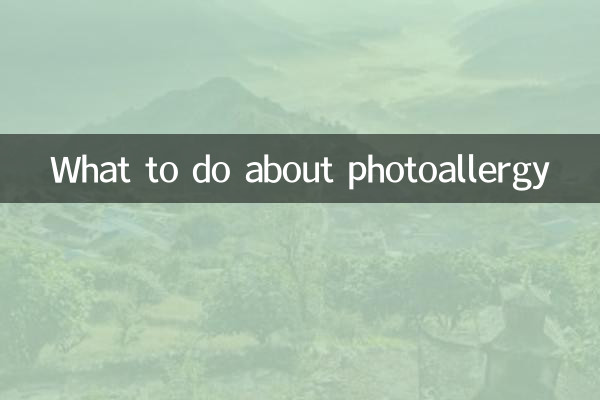What to do about photoallergy
Photoallergy is a skin reaction that is overly sensitive to ultraviolet or visible light, manifesting as redness, swelling, itching, rashes and other symptoms. Recently, photoallergy has become a hot topic, and many netizens have shared their coping experiences on social platforms. This article will combine the hot content of the entire network in the past 10 days to provide you with structured solutions.
1. Common symptoms of photoallergy

| Symptom type | Specific performance | High-risk groups |
|---|---|---|
| acute reaction | Skin redness, swelling, burning sensation, and blisters | Children, sensitive skin |
| Chronic reaction | Pigmentation, rough skin | Long-term outdoor worker |
| systemic reaction | Headache, fever, fatigue | Immunocompromised people |
2. Recent popular prevention and treatment methods
According to the analysis of social media data in the past 10 days, the following prevention and control methods are the most discussed:
| method type | Specific measures | Hot discussion index |
|---|---|---|
| physical protection | UPF50+ sun protection clothing, wide-brimmed hat | ★★★★★ |
| drug therapy | Oral antihistamines, topical corticosteroids | ★★★★☆ |
| naturopathy | Aloe vera gel cold compress, green tea extract | ★★★☆☆ |
3. Grading treatment plan
1.Mild symptom management
• Immediately protect from light and rinse affected area with cold water
• Apply a non-irritating moisturizer
• Oral vitamin C to enhance immunity
2.Moderate symptom management
• Use 1% hydrocortisone ointment
• Take anti-allergy medicines such as loratadine
• Keep the affected area clean and dry
3.Severe symptom management
• Seek immediate medical attention, phototherapy may be needed for desensitization
• Systemic use of immunomodulators
• Get allergen testing
4. Popularity ranking of preventive measures
| Ranking | Precautions | Difficulty of implementation |
|---|---|---|
| 1 | Use broad-spectrum sunscreen daily | ★☆☆☆☆ |
| 2 | Avoid going out between 10:00-16:00 | ★★☆☆☆ |
| 3 | Vitamin D supplementation enhances light resistance | ★★★☆☆ |
5. Latest research progress
1. Gene therapy research shows that specific gene mutations are highly related to photosensitivity
2. The new photoprotectant SPF130+ product will be launched soon
3. Microbiome research finds that imbalance of intestinal flora may aggravate symptoms
6. Special reminder
• Photosensitivity may indicate diseases such as systemic lupus erythematosus, and repeated attacks require a comprehensive examination
• Certain drugs (such as tetracyclines) can aggravate photosensitivity, so you should consult your doctor before taking any drugs.
• Winter snow reflects UV rays and still requires protection
Through the above structured solutions, we hope to help patients with photoallergy cope scientifically. It is recommended to choose the appropriate method according to the individual situation. In serious cases, be sure to seek medical treatment in time.

check the details

check the details